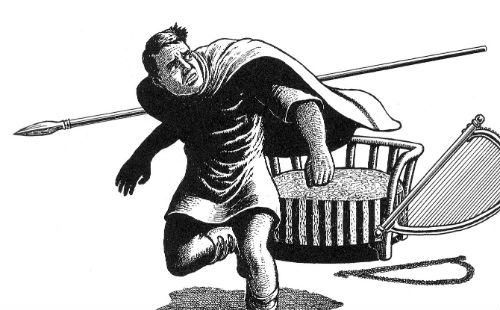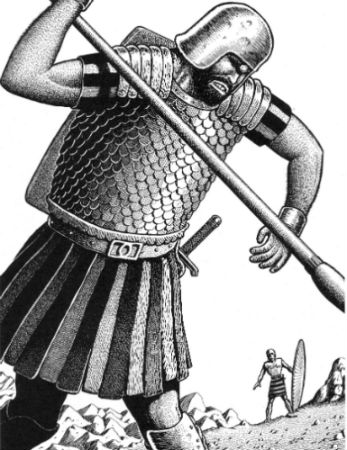 King David well knew about danger, stress and terror.
King David well knew about danger, stress and terror.By Neil Earle
 King David well knew about danger, stress and terror.
King David well knew about danger, stress and terror.Psalm 31 has been called “Luther’s Anchor.” The distinguished Bible teacher Derek Kidner gives it the simpler title of “Stress” in the Tyndale Old Testament Commentary on the Psalms.
According to some analysts the influence of this one Psalm went far and wide. Some see it showing up in Jonah’s prayer (Jonah 3:6). Jeremiah seems to know of verse 13 (Jeremiah 17:17). In old age the author of Psalm 71 opened his mediation with a direct borrowing from Psalm 31: 1-3. Finally, and most importantly, the dying Jesus cites its words in Psalm 31: 5, “Into your hands I commit my spirit.”
Those are high cross-references indeed.
What is there in these twenty-four verses that can speak so earnestly to us today, living in our own time of terror as well as fighting the daily grind? Much. Kidner claims that the structure of the song includes two journeys from stress to relief and assurance – Psalm 31:1-8 and again in verses 9-24.
Let’s take a look.
The first six verses are pleas of desperation amid trouble – “Let me not be ashamed,” deliver me, “turn your ear to me,” come quickly,” “free me, “redeem me.” This is a volley of requests not untypical of the situation King David as hunted outlaw at one phase of his life found himself in. David had rescued Israel from Goliath and ended up with a jealous king trying to make him a pin-cushion (1 Samuel 22:1-2).
 Goliath shot – David's victory over Goliath stirred the jealously of many.
Goliath shot – David's victory over Goliath stirred the jealously of many.That would make anyone bitter, but…David’s trust in God was not easily negated. The Psalms redound with a sense of the Living God’s reality, of God’s nearness and concern and his ability to deliver. Also a fierce and passionate sense of trust. “In You O Lord I have taken refuge,” gets us started (verse 1) and God is a bolt-hold for all devout Christians to cling to in times of trouble. “Thanks be to God who gives us the victory through our Lord Jesus Christ,” is Paul's echo of these sincere Old Testament pleas (1 Corinthians 15:57). God can and will deliver, He is Yahweh God the Creator of the universe and he has all the power and might of the Godhead ready to come to our aid.
Nor need God’s people be buffeted about by feelings of shame, unworthiness and forsakenness.Christians need not stay in Shame Alley for long. “For you died and your life is hid with Christ in God” (Colossians 3:1-3). Like the hymn says:
“Clothed in his righteousness alone/boldly we stand before his throne.”
When God looks down, he doesn’t see us and our unworthiness. He sees us covered with Christ (Romans 13:14). In David’s writing the word “redeem” (verse 5) does not have a primarily spiritual meaning but rather, one of rescue form life-threatening physical danger. David’s life – like Martin Luther's after him – was often one long season of ducking spears, plots, assassination attempts and cruel rejections and betrayals. Yet his faith remained at a very high level: “I will be glad and rejoice in your love, for you saw my affliction…you have not handed me over to the enemy but have set my feet in a spacious place” (v.8-9).
This trumpet blast of praise rounds out the first section. David had seen enough already – killing Goliath for example – to know that God was his Rock and Fortress. Past deliverances impelled him to an act of trust and praise before his God.
But one thing every struggling Christian knows is that trouble doesn’t leave us alone for very long. “It is through much trouble we enter the Kingdom of God” (Acts 13). In Psalms 31:9-24 David is back at it again, hammering out faith, trust and praise in spite of dastardly odds. He moves from gloom (“my life is consumed”) to hopelessness (“I have become like broken pottery”) to terror (“there is terror on ever side”).
“Terror on every side” is something that can begin to push at us when we fly in a plane or find ourselves with a broken vehicle on a strange street in gathering darkness or forced to convey the one we love to the ER. “But” there is the different note – “but I trust in you O Lord, I say, You are my God, my times are in your hands.”
David’s faith rallies and he besieges the heavenly throne with another rush of requests. “Deliver me,” save me” uphold me from shame.”
This is all right. Christian are told to come boldly to the throne of grace, and to let out “petitions” if such they are come to the ears of God. This is a lot of what the Christian life is all about.
The great Puritan teacher John Owen wrote about Christians needing to have the courage to ask for a blessing from God: “God declares that there is forgiveness with him, that your condition is not desperate nor helpless. There are yet terms of peace proposed to you. Methinks it cannot but seem strange that poor sinners should not at the least stir up themselves to inquire after them….Do not put it off; this thing belongs to you; the great concern of your souls lies in it. It is a great matter.”
As happens so often in the psalms the writer emerges from the crisis as expressed in the calm, measured and rich appreciation of the benefits of God’s saving action in the rough and tumble of life with its many stresses and strains. After a detour in verses 17 to 18 where David asks for God to judge his enemies – not necessarily recommended for Christian readers – his last verses glide smoothly into a reconciliation reminiscent of a smooth ending after a turbulent Beethoven symphony:
“How great is your goodness which you have stored up for those who fear you.” Note the phrase “stored up.” This came from an experienced believer and one who had been delivered often from “the intrigues of men” (verse 20). We buzz around “bewitched bothered and bewildered” as the song says and yet David has shown us assurance in God. It is real and vital good news because it is an assurance based on God’s nature, his readiness to help and forgive and restore. God has something better in store if we hide ourselves in Him, in “his dwelling, as it says in verse 20.
Through such trials, writes John Owen “we discover (or rediscover) the Excellency of the love of God in Christ which passes knowledge. By this they are enabled to look within the veil and to take view of the blessed consolations which the saints enjoy, whose communion with God is never interrupted: this represents to them all the joy and love which in former days they had whilst God was present with thane in love.”
Verses 21-25 are a rushing summary conclusion of the whole piece – I was in trouble but God shows me his wonderful love, this makes him worthy of my praise and worthy of my love. The message is for us, too, for the story of this striking deliverance from real enemies with deadly weapons applies to us. In verse 24 we are part of those who “hope in the Lord.” And that is surely the best cause for hope in all our distresses and perplexities.